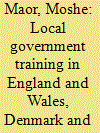| Srl | Item |
| 1 |
ID:
112319


|
|
|
|
|
| Publication |
2012.
|
| Summary/Abstract |
The electricity sector has to undergo a large-scale transformation process to reduce the threat of climate change. Wind power has a strategic role to play in this process. This paper makes a preliminary assessment of the types and numbers of engineers required to sustain a large-scale expansion of offshore wind energy in the EU and draws lessons for universities. A variety of competences are required, including (a) deep competences in many fields (electrical and mechanical engineering, but also engineering physics and civil engineering); (b) integrative competences within engineering (e.g., mechanical and electrical engineering) and between engineering and non-engineering fields (e.g., meteorology and logistics). A large number of engineers are required. A rough estimate indicates a need for more than 10 000 new engineers until 2020. The nature and volume of the competences required raise serious questions for the scale and organization of training programmes at universities.
|
|
|
|
|
|
|
|
|
|
|
|
|
|
|
|
| 2 |
ID:
096940


|
|
|
|
|
| Publication |
2010.
|
| Summary/Abstract |
This article highlights an interesting and often unduly neglected aspect of comparative public policy and administration: local government training. The argument advanced is that local government training based on the centrally focused model may tend to be: (i) skill-oriented and competence-framed; (ii) comprehensive; and (iii) quality-controlled in a relatively rigorous manner. By contrast, local government training based on the locally focused model may tend to be: (i) skill-oriented and competence-framed alongside a focus on 'people' and organizational issues, conventional policy issues and broad local government issues; (ii) non-comprehensive, and (iii) weakly controlled for quality. The integrative model, which is the most innovative form of the three models presented here, may tend to manifest a varied mix of the aforementioned features. Based on an institutional analysis combined with interviews with senior training officials at national and local levels, this argument is illustrated in England and Wales, Denmark and Israel in the hope that it could be a starting point for developing hypotheses and propositions.
|
|
|
|
|
|
|
|
|
|
|
|
|
|
|
|